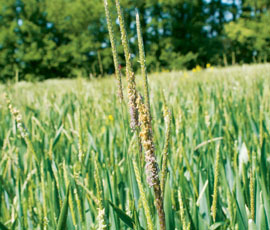GM trials in UK get green light

DEFRA has given the go ahead for a genetically modified wheat trial in the UK.
The trial on the aphid resistant wheat variety will be carried out by scientists from Rothamsted Research station in 2012 and 2013.
The trial was given the green light only after gaining approval from the independent expert group – the Advisory Committee of Releases to the Environment (ACRE).
In a statement ACRE said it was satisfied that the proposed trial would not result in any adverse effect on human health or the environment.
But the committee imposed a number of precautionary conditions to the statutory consent for the trial.
These aim to ensure that no GM material from the trial will enter the food and feed chain.
ACRE’s advice:
• Wheat pollen barrier planted to flower at the same time as the GM wheat.
• Ensure 20m surrounding the trial site is planted with a non-cereal crop
• Control cereal volunteers before planting
• Control of couch grass using glyphosate within trial and surrounding 20m
• Ensure all wheat and barley material in the area of release is inactivated at end of trial
• Ensure the GM wheat harvest field is left fallow for one year after harvest
• Treat volunteers in the fallow year with glyphosate
A full copy of ACRE’s advice can be found at on DEFRA’s website.
However, despite the precautions, campaign group GM Freeze said the trial was “a big mistake and premature”.
Pete Riley of GM Freeze said:
“It is clear from the authorisation letter that the government’s scientific advisers have concerns about the possibility of the GM wheat crossing with couch grass, a major arable weed, which could cause long-term problems for farmers if this wheat was ever grown on a commercial scale.
“There are also concerns about wild birds carrying the GM seeds off site, but there is no provision to deal with small birds, such a sparrows, or small mammals doing this,” Mr Riley said.
“The key question ministers need to answer is why they are funding research into GM wheat for which there is no market in the UK, Europe or anywhere else when other areas of proven, less risky agricultural research, such as agroecology, are crying out for additional funds.
“The decision to approve an open-air trial of GM wheat is a big mistake and premature given the serious lack of information in the application. We need to know far more about the chemicals involved and the formation of wheat-couch grass crosses before we start genetically modifying a staple crop.”
